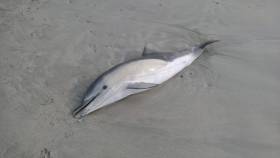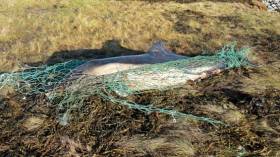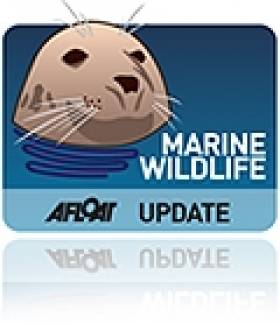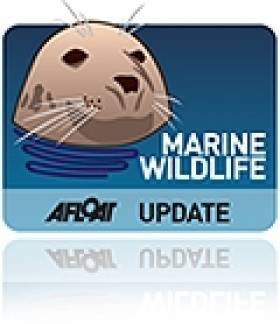Displaying items by tag: common dolphins
IWDG Records Spate of Dolphin & Whale Strandings Around Irish Coast
The Irish Whale and Dolphin Group (IWDG) has appealed for the public to keep a look-out after a spate of marine wildlife strandings reported in recent days.
Half of the six reports were live strandings, the group says, but only one animal was successfully returned to the water.
In Galway, a common dolphin live stranded with serious injuries but died shortly after IWDG members arrived at the scene.
Another common dolphin live stranded at Mulranny in Co Mayo. Local woman Catherine Hanley, who reported the stranding, managed to refloat this dolphin with her group and it has not been seen since.
In Co Donegal, a “very emaciated” Cuvier’s beaked whale live stranded at Dooey Beach in Downings, on the Rosguill peninsula, but died shortly after.
 An emaciated Cuvier’s beaked whale live stranded on Dooey Beach in Downings. The deep-ocean species has a significant population near Irish waters but is rarely sighted
An emaciated Cuvier’s beaked whale live stranded on Dooey Beach in Downings. The deep-ocean species has a significant population near Irish waters but is rarely sighted
Elsewhere, the remains of three more cetaceans were reported around the coast in recent days.
In Rathmullen, Co Donegal, the carcass of a common dolphin appears to match video of a dolphin swimming in the area the previous day, suggesting a live stranding.
At Greenore in Co Louth, at the mouth of Carlingford Lough, a common dolphin in “very fresh condition” was reported to the local IWDG group.
And in Passage East, Co Waterford, a carcass in “very poor” condition has been logged as “dolphin species” as its advanced state of composition made further identification impossible.
The IWDG appeals for the public to report all strandings “so we respond immediately and monitor the status of our whales and dolphins”.
A local community in eastern Co Mayo rallied to attempt to save as many as 13 common dolphins that live-stranded near Blacksod on Friday (13 August).
As Mayo IWDG’s Facebook reports, the family group comprising 13 dolphins — mainly mothers and calves with a large male — stranded at Tarmon Beach with the tide dropping.
Sadly three of the dolphins died before they could be helped, but the rest responded to being cooled with buckets of seawater by local volunteers assisting the area’s Irish Whale and Dolphin Group (IWDG) members.
As the tide was still dropping for over an hour, it was quickly decided to move the dolphins 2km by road to the slipway at Blacksod where they could be more easily immersed and cared for.
The local IWDG team used their new wheeled dolphin stretcher to transport the larger marine wildlife to a horse box, while the juveniles were carried in beach towels.
Once carefully released back into the water, all were seen to swim quickly and without obvious distress, and by 9pm the pod had left the area.
“Tarmon and the surrounding beaches on the east side of the Mullet Peninsula are notorious for common dolphins live-stranding due to the topography of the beaches,” Mayo IWDG said.
“The beaches are large flat expanses so during spring tides especially, the water can level can drop uniformly and recede up to 1km in parts. Common dolphins being an offshore dolphin species often get caught out on such difficult-to-navigate shallow terrain.
“When a dolphin live-strands it puts immense pressure on their bodies. They can become very disorientated and have muscle spasms from the stranding event making it difficult to swim, which is why this group were given recovery time at Blacksod before being released.
“Thanks again to everyone who helped out today; it was so humbling to see everyone work together to get this pod back to the sea.”
 Juvenile dolphins cooled down with wet towels and seaweed were given recovery time with their pod before release | Credit: Mayo IWDG/Facebook
Juvenile dolphins cooled down with wet towels and seaweed were given recovery time with their pod before release | Credit: Mayo IWDG/Facebook
Elsewhere, the IWDG reports on two separate strandings of Sowerby’s beaked whales in Co Galway. The first was found washed up on Inisbofin at the end of the week while the second was reported yesterday (Saturday 14 August) across the water in Cleggan.
Commenting on the former report, the IWDG said: “Beaked whales are not stranded that frequently but this individual had evidence of rope marks on its body.
“As [they are] an offshore deep-diving species we don’t expect beaked whales to get entangled in fishing gear or interact with offshore activity.
“Maybe these rope marks were not from fishing but some other source. Hard to tell, but without a full post-mortem examination the cause of death will remain speculative.”
IWDG Marks Another ‘Record’ Year For Cetacean Strandings
#MarineWildlife - The Irish Whale and Dolphin Group (IWDG) has expressed its dismay at another record year for cetacean standings around the Irish coast.
The first eight months of 2017 alone have seen 201 recorded strandings - up 30% compared to the same period in the last two years.
“As in recent years, the numbers of dead common dolphins recorded are very high, with 78 records for this species to the end of August 2017 accounting for 39% of all strandings,” says IWDG strandings officer Mick O’Connell, who notes that the numbers of dead dolphins washing ashore in late winter and spring has grown unusually high.
“Even in a series of years with particularly high numbers of this species stranding since 2011, 2017 is well ahead of the previous two ‘record’ years by the end of August — 66 in 2016 and 53 in 2013.
“These are, of course, minimum numbers as we don't know how many dead animals go unrecorded and also many unidentified dolphins which aren't identifiable to species level are likely to be common dolphins,” he adds.
The IWDG is currently working with the Marine Institute, Department of Agriculture and National Parks and Wildlife service on a post-mortem scheme for common dolphins, striped dolphins and harbour porpoises which is hoped will shed new light on what might be causing this alarming rise in cetacean deaths.
Meanwhile, there was more positive news from the recent all-Ireland whale watch at the end of August, where three-quarters of the 20 sites around the island recorded sightings.
Around 1,300 whale watchers and wildlife enthusiasts spotted eight species of cetacean between them — with the busiest site at Loop Head in Co Kerry, where 120 lucky visitors got to see two humpback whales, five minke whales, six bottlenose and a whopping 50 common dolphins.
Other marine wildlife species spotted around the coast included Risso’s dolphins, blue fin tuna, ocean sunfish and grey seals.
More recently, the IWDG’s Celtic Mist embarked on a week-long survey of the waters around North and West Kerry, and its crew shared a video of some of their sightings.
#MarineWildlife - Strandings of common dolphins for the first two months of the year are at their second highest since records began in 2002, says the Irish Whale and Dolphin Group (IWDG).
A total of 28 confirmed standings were recorded in the IWDG's strandings database in January and February of this year, just below 2013's worst figures so far when 31 were reported.
That compares to an average of fewer than six reports for the same period each year between 2002 and 2010.
The current decade has seen a significant jump in recorded figures, with 18 reports of dolphin standings in 2011 compared to just two in the same months in 2010.
Many of the dolphins found this year were recorded in the North West, a great number of them drowned according to post-mortem results, while others showed signs of being tangled in fishing gear, which suggests they were bycatch in the nets of supertrawlers that ply the seas off Donegal, Sligo and Mayo.
"While there is no conclusive proof of what vessels are involved, the evidence points to the presence of large (c.100m) foreign registered freezer trawlers fishing in Irish offshore waters."
That's according to the IWDG's strandings officer Mick O'Connell, who warns that "the number of bycaught dolphins that actually get washed ashore and recorded as stranded may be only a small percentage of the actual number of dead animals."
The IWDG reiterates the call for independent observers to be placed on supertrawlers in Irish waters, following controversy over the visit of one of the world's largest fishing boats last November.
In other news, Scotland's Press and Journal reports that a humpback whale was killed after getting trapped in fishing ropes in the Outer Hebrides.
The juvenile whale was found dead on the Isle of Barra this week with the "classic signs of having suffered entanglement."
'Unusual' Dolphin, Whale Strandings In Northwest
#MarineWildlife - Seven dolphins and two beaked whales have stranded on beaches in the northwest in events described as "unusual" by the Irish Whale and Dolphin Group (IWDG).
On the Mullet Peninsula, a group of seven common dolphins - comprising five adults and two juveniles - live stranded at Tarmon Beach on Sunday 12 May.
Though initial attempts to refloat them were successful, one of the juveniles was later found dead and the other was euthanised due to poor health.
Meanwhile in Donegal, the fresh carcass of a female True's or Sowerby's beaked whale was found on Sunday evening on Five Fingers Stand at Inishowen - some days after a reported live stranding of a Sowerby's beaked whale on the Welsh coast.
The Inishowen stranding was followed yesterday 14 May by the discovery of a dead beaked whale calf at Trawbreaga Bay, in what is believed to be a connected stranding.
Samples of the adult female were taken in order to confirm the species, either of which would mark a rare cetacean record for Ireland - the first since 2009.
Fin Whale 'Feeding Frenzy' Off Hook Head
#MARINE WILDLIFE - A "feeding frenzy" involving a pod of fin whales was spotted off Hook Head in Co Wexford last week, The Irish Times reports.
And according to Andrew Malcolm of the Irish Whale and Dolphin Group (IWDG), two of the whales were in the same location almost exactly a year ago.
Malcolm, who was with a group on board the Rebecca C, used photographs of the whale's dorsal fins to compare records for the confirmation.
The pod of six fin whales was seen feeding some 3km southeast of Hook Head, attracted by the herring spawning grounds in the area.
More than 30 other cetaceans, including common dolphins, porpoises and a minke whale, were sighted on the trip.
The Irish Times has more on the story HERE.



























































